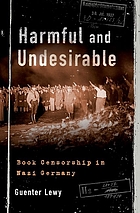Banned & Challenged Books: The Freedom to Read
Why Book Banning Happens
Reported Rationale Word Clouds
ALA's Banned and Challenged Books: Reported Rationale Word Clouds
Below, you will find the ALA's word cloud representation of rationales that have been cited by individuals and organizations who have challenged books. (Word clouds are generated by the number of times a word or phrase has been recorded, where the prominence of the word or phrase correlates with the number of times it has been used.)
Note that although book challenge rationales are often a reflection of ideologies generally associated with politically or socially conservation viewpoints, there are plenty of challenges that reflect other viewpoints across the political and social spectrum.
Note the changes in these word clouds over time. What do you notice? What rationales grow over time? Which recede? Which ones appear or disappear altogether? What events or social changes do you know about that have influenced the reasons people give for seeking a book ban or challenge?
-
Link to "Top Ten Most Challenged Book Lists"ALA publishes a top 10 list of the most frequently challenged books for each year. See what kinds of patterns you notice from 2001 to 2020 (data for 2021 is not yet available).
Reasons over time, 2014-2020
Reasons for Challenges
For the time that ALA has been creating word clouds of the reasons, 2014 to current, we can see visually that reasons change over time. Book challenges are a snap-shot of our current cultural, social, and political fears. Note for 2020 that objections to content that promotes Black Lives Matter makes its first appearance. (Unfortunately the reasons word cloud has not been available from ALA since 2022.)
(click on images to enlarge)
Reasons for Challenges, 2015
For the time that ALA has been creating word clouds of the reasons, we can see visually that reasons change over time. Book challenges are a snap-shot of our current cultural, social, and political fears.
(click on image to enlarge)

Featured books - Click to learn more
Recent book challenges and bans - Race and LGBTQ+
Better Nate than ever
"Nate's whole life, he's wanted to star in a Broadway show. But how is Nate supposed to make his dreams come true when he's stuck in Jankburg, Pennsylvania, where no one (except his best pal Libby) appreciates a good show tune?"
This one summer
rational for challenge/ban: inclusion of coming of age sexual identity storyline
Beyond magenta: Transgender teens speak out
" "Author and photographer Susan Kuklin met and interviewed six transgender or gender-neutral young adults and used her considerable skills to represent them thoughtfully and respectfully before, during, and after their personal acknowledgment of gender preference. Portraits, family photographs, and candid images grace the pages, augmenting the emotional and physical journey each youth has taken."
Fun home
Rationale for challenge/ban: inclusion of lesbian coming-of-age and a gay father character
I Am Jazz
rationale for challenging/ban: Transgender main character
Drama
Callie loves theater. And while she would totally try out for her middle school's production of Moon over Mississippi, she can't really sing. Instead she's the set designer for the drama department's stage crew, and this year she's determined to create a set worthy of Broadway on a middle-school budget...
Except where otherwise noted, the content in these guides by Tacoma Community College Library is licensed under CC BY SA 4.0.
This openly licensed content allows others to cite, share, or modify this content, with credit to TCC Library. When reusing or adapting this content, include this statement in the new document: This content was originally created by Tacoma Community College Library and shared with a CC BY SA 4.0 license.
Tacoma Community College Library - Building 7, 6501 South 19th Street, Tacoma, WA 98466 - P. 253.566.5087
Visit us on Instagram!
















